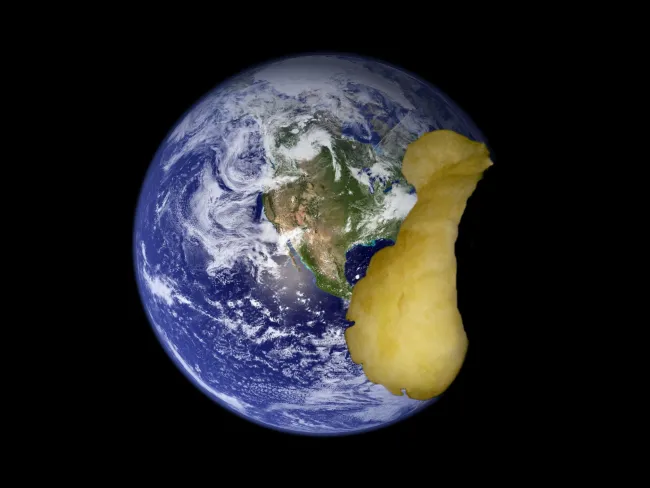A combination of measures including a shift towards plant-based diets, halving food waste and technological changes in agriculture (such as more efficient fertiliser application, feed additives and changes in irrigation) could significantly reduce the food system’s environmental impacts relative to 2050 projections and potentially even reduce impacts below today’s levels, according to a new paper.

Without action, the food system’s impacts in 2050 are projected to be 50% to 92% higher than 2010 impacts (depending on the environmental indicator), due to a growth in population from 6.9 billion to 8.5 to 10 billion and a tripling of global income (which will enable a shifting of diets towards animal products and fruit and vegetables, and away from staple crops). As shown in the figure below, much of the projected increased level of greenhouse gas emissions is attributed to the rise in consumption of animal products (red).

Image: Present (2010) and projected (2050) environmental pressures on five environmental domains divided by food group. Figure 1, Springmann et al.
The paper then evaluates the effects of reducing food waste, technological changes in agriculture and shifting towards plant-based foods in a “flexitarian” diet. Combining all these options at a level of medium ambition (e.g. halving food waste) could result in food system impacts in 2050 that are within 15% above or below current impacts, while combining all options at a level of high ambition (e.g. reducing food waste by 75%) could mean 2050 impacts are 20% to 55% lower than today.
Dietary change is predicted to have the greatest effect on reducing greenhouse gas emissions, while technological change has significant contributions to reducing cropland use, blue water use, and nitrogen and phosphorus application.
Abstract
The food system is a major driver of climate change, changes in land use, depletion of freshwater resources, and pollution of aquatic and terrestrial ecosystems through excessive nitrogen and phosphorus inputs. Here we show that between 2010 and 2050, as a result of expected changes in population and income levels, the environmental effects of the food system could increase by 50–90% in the absence of technological changes and dedicated mitigation measures, reaching levels that are beyond the planetary boundaries that define a safe operating space for humanity. We analyse several options for reducing the environmental effects of the food system, including dietary changes towards healthier, more plant-based diets, improvements in technologies and management, and reductions in food loss and waste. We find that no single measure is enough to keep these effects within all planetary boundaries simultaneously, and that a synergistic combination of measures will be needed to sufficiently mitigate the projected increase in environmental pressures.
Reference
Springmann, M., Clark, M., Mason-D’Croz, D., Wiebe, K., Bodirsky, B. L., Lassaletta, L., de Vries, W., Vermeulen, S. J., Herrero, M., Carlson, K. M., Jonell, M., Troell, M., DeClerck, F., Gordon, L. J., Zurayk, R., Scarborough, P., Rayner, M., Loken, B., Fanzo, J., Godfray, H. C. J., Tilman, D., Rockström, J., and Willett, W., 2018. Options for keeping the food system within environmental limits. Nature, doi.org/10.1038/s41586-018-0594-0
Read the full article here or here and the Oxford Martin School’s press release here. For details on the health implications of several different eating patterns, see this paper by some of the same authors: Health and nutritional aspects of sustainable diet strategies and their association with environmental impacts: a global modelling analysis with country-level detail.
See also the Foodsource chapter How can we reduce food-related greenhouse gas emissions? You may also be interested in this op-ed written by food researcher Joseph Poore: We label fridges to show their environmental impact – why not food?




Comments (0)